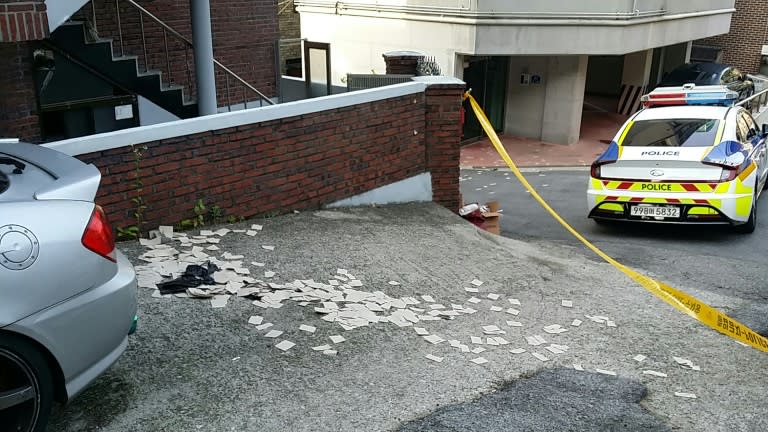S.Korea resumes loudspeaker propaganda, North vows 'counteraction'

South Korea on Sunday resumed a loudspeaker propaganda campaign against the North, as Pyongyang sent a fresh barrage of trash-filled balloons across the border and vowed "new counteraction."
Relations between the two Koreas are at one of their lowest points in years, and in recent weeks the two have engaged in tit-for-tat campaigns, with analysts warning the escalating cycle could end in actual military skirmishes.
Seoul this month suspended a 2018 military deal aimed at reducing tensions on the peninsula after Pyongyang sent hundreds of balloons carrying bags of garbage, including cigarette butts and plastic waste, paving the way for the resumption of the loudspeaker broadcasts.
The broadcasts, a tactic which dates back to the 1950-1953 Korean War, infuriate Pyongyang, which previously threatened artillery strikes against the loudspeaker units unless they were switched off.
The powerful sister of North Korean leader Kim Jong Un warned the escalation could become a "very dangerous situation", and that Seoul should expect "new counteraction", according to a statement published by the North's state-run KCNA.
Kim Yo Jong, who in addition to being the leader's sister is also one of the regime's key spokespeople, said that the North's latest balloon campaign had been planned to end on Sunday, but with the resumption of the loudspeaker broadcasts, "the situation has changed."
"This is a prelude to a very dangerous situation," she said, adding that if Seoul "simultaneously carries out the leaflet scattering and loudspeaker broadcasting provocation over the border, it will undoubtedly witness the new counteraction" of the North.
South Korea "will suffer a bitter embarrassment of picking up waste paper without rest and it will be its daily work," she added.
Seoul's Joint Chiefs of Staff said the military had conducted a loudspeaker broadcast in the afternoon, and that whether additional broadcasts would follow "depends entirely on North Korea's actions."
The president's office had earlier confirmed the move, describing it as "corresponding measures" for the more than 300 trash-filled balloons Pyongyang sent across the border in a fresh blitz that started on Saturday.
"Although the measures we are taking may be difficult for the North Korean regime to endure, they will deliver messages of light and hope to the North Korean military and citizens," it said.
Late Sunday, Seoul's military said the North was "again floating (suspected) balloons carrying trash towards the South," advising the public to report any balloons to authorities and refrain from touching them.
- 'Low-class' -
Officials in Gyeonggi province sent out a text alert to residents late Sunday, warning about the new balloons.
Seoul's military has said analysis of the balloons that arrived Saturday "shows there were no substances that were harmful to safety" and that they contained plastic and waste paper.
"North Korea is making another low-class provocation with trash balloons against our civilian areas," Seoul Mayor Oh Se-hoon wrote in a Facebook post.
Activists in the South have sent dozens of balloons bearing K-pop, dollar bills and anti-Kim Jong Un propaganda northwards in recent weeks.
Pyongyang sent nearly a thousand balloons across the border in late May and early June before calling off its campaign. It restarted on Saturday in response to new launches last week by activists, against which Seoul's government has almost no legal recourse.
- Low point in ties -
Seoul's decision to resume the loudspeaker broadcasts could have serious implications, experts said, with previous propaganda tit-for-tats having had real-world consequences for inter-Korean relations.
"There is a high possibility the resuming of speakers could lead to an armed conflict," Cheong Seong-chang, director of the Korean peninsula strategy at Sejong Institute, told AFP.
"It is likely that North Korea will resume firing in the West Sea or fire at the balloons if the South sends any again," Cheong said.
"North Korea has been jamming GPS signals for several days last week and it is likely for this kind of provocation to appear in a much stronger form in the West Sea as well."
In 2018, during a period of improved inter-Korean relations, the leaders of the two Koreas agreed to "completely cease all hostile acts", including stopping the leaflets.
The South Korean parliament passed a law in 2020 criminalising sending leaflets to the North, but activists did not stop and the law was struck down by the Constitutional Court last year as an undue limitation on free speech.
The opposition Democratic Party criticised the government for not doing more to stop the activists' balloons, with a spokesperson at a Sunday briefing saying they were using "'freedom of expression' as an excuse to jeopardise the safety of our people".
They also said the resumption of loudspeaker campaigns was not wise, adding that "the government's move poses a risk of escalating into a regional war".
hs/ceb/dhw/des/bfm


